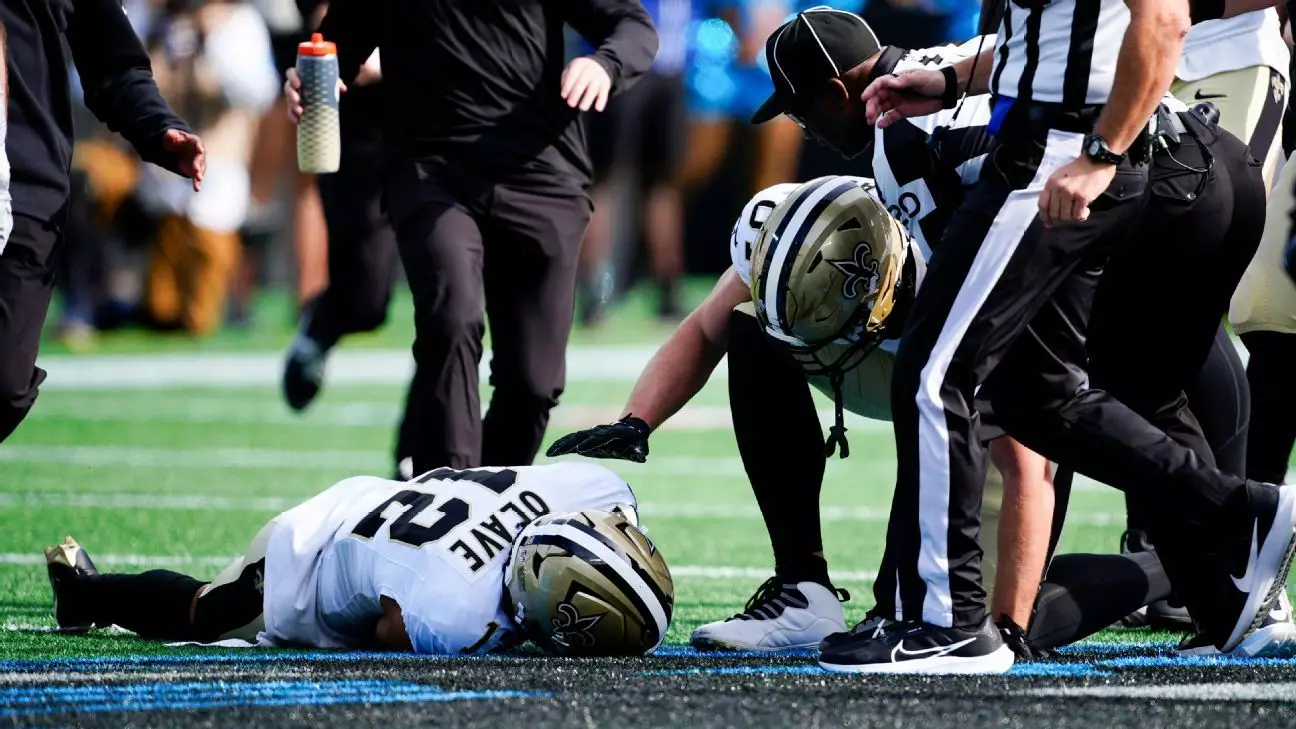The world of professional football is marked by intensity, both on and off the field. The recent incident involving New Orleans Saints wide receiver Chris Olave has sparked discussions on player safety, the impact of injuries, and tensions among teammates. Following Olave’s second concussion of the season during a closely contested game against the Carolina Panthers, the narratives surrounding player health and interpersonal dynamics within teams have come to the forefront.
Chris Olave’s injury during the Saints’ narrow loss was a stark reminder of the physical toll that football can impose on players. After sustaining a hit to the head midway through the first quarter, Olave was so severely impacted that he required medical evaluation and transport to a local hospital. This incident marks his fourth entry into the NFL’s concussion protocol, raising alarms regarding the long-term health of a young player still finding his footing in the professional arena.
As the league grapples with its concussion policies, incidents like Olave’s illuminate the broader conversation surrounding player safety. These instances evoke a sense of urgency among medical staff, players, and coaching personnel, all of whom have a vested interest in addressing the real ramifications of head injuries. Olave’s situation is not an isolated case. Occurrences of such concussive blows are common in a sport known for its physicality, and it is critical for the NFL to refine its measures to protect its players.
The aftermath of Olave’s injury took a contentious turn when his former teammate, Michael Thomas, took to social media to deflect blame onto quarterback Derek Carr. In a series of tweets, Thomas openly critiqued Carr’s performance and methods, suggesting that the injury was in part due to Carr’s decisions on the field. This public airing of grievances has not only reignited discussions about Carr’s effectiveness as a quarterback but also revealed deeper fissures within the team dynamic.
While Thomas’s comments could be interpreted as an expression of frustration, they also cast a glimpse into unresolved issues within the locker room. Their relationship has been strained; Thomas was released by the Saints earlier this year after a tumultuous tenure, and his tweets suggest an ingrained resentment towards Carr and the current direction of the team. By blaming Carr for Olave’s injury, Thomas has drawn attention to questions of accountability, player relationships, and the pressures athletes face within the organization.
In a tense post-game interview, Derek Carr addressed Thomas’ explosive remarks, insisting that he bears no ill will towards him. Carr acknowledged the emotional weight of injuries on the field, expressing that he shares the emotional burden of seeing a teammate hurt. He emphasized a desire for camaraderie but also lamented the ongoing rift with Thomas, who he felt had chosen to lash out online instead of resolving their differences privately.
Carr’s response highlights a significant aspect of sports: the emotional labor athletes endure. The public nature of Thomas’ critiques thrust Carr into a defensive position, forcing him to navigate not only his responsibilities as a leader on the field but also his obligation as a teammate in a turbulent interpersonal environment. His insistence that he did not intend for Olave to be placed in danger challenges the notion of blame and accountability within the game, reinforcing that injuries, albeit unfortunate, are a part of the competition.
Adding layers to an already complex narrative, Chris Olave’s brother Josh responded to Thomas’ comments by supporting his sibling and underscoring the collective frustration that often surrounds the game. His social media activity suggests that the controversy cannot be understood merely in terms of professional rivalry but speaks to the familial bonds at play. In professional sports, family often extends beyond blood; it encompasses teammates and the larger organization.
This family-oriented perspective could foster a more supportive environment, which may promote healing and growth for Olave. By highlighting the camaraderie and loyalty within their dynamic, Josh helps to shift the dialogue from one focused solely on blame to a more nuanced understanding of the complexities of player relationships.
Chris Olave’s recent injury and the accompanying controversies emphasize the tremendous pressures athletes navigate. Player health must remain a paramount concern, while interpersonal relationships within teams require nurturing and open communication. As the NFL continues to address issues of player safety, it is equally essential to ensure that the fabric of team dynamics evolves to reflect the ethos of sportsmanship and respect. The intersection of health, rivalry, and relationship complexities may define not only the future of players like Olave but also the integrity of the league itself.


Leave a Reply